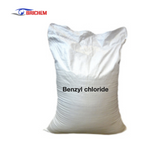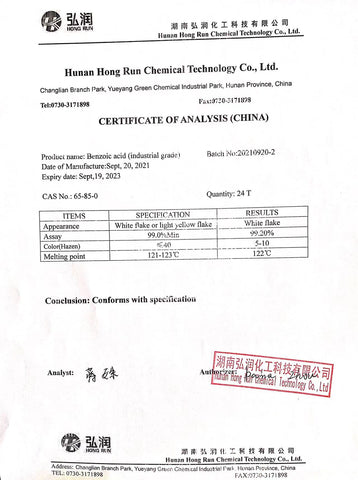
1. Synonyms
210;a 1 (acid);Acide benzoique;Benzoic aBenzoic acidcid;Mefenamic Acid Impurity D;Benzyl acid;SS Benzoic Acid;Glycopyrronium Bromide EP Impurity D
2. Usage
Benzyl acid, also known as benzoic acid, is a white crystalline solid that is widely used in various industries. Here are some of its main uses:
- Food preservative: Benzyl acid is a commonly used preservative in the food and beverage industry. It inhibits the growth of bacteria, yeast, and fungi, thereby increasing the shelf life of food products.
- Pharmaceutical applications: Benzyl acid is used as an intermediate in the production of various pharmaceutical drugs. It is often used as a raw material in the synthesis of antiseptics, analgesics, and diuretics.
- Cosmetic and personal care products: Benzyl acid is used in the formulation of various cosmetic and personal care products, including creams, lotions, shampoos, and soaps. It acts as a preservative, as well as a pH adjuster and fragrance ingredient.
- Industrial applications: Benzyl acid is used in the production of various industrial chemicals, such as dyes, perfumes, and plasticizers. It is also used as a rust inhibitor in metalworking fluids and as a precursor to phenylacetic acid, which is used in the production of pharmaceuticals and fragrances.
- Laboratory use: Benzyl acid is often used as a reagent or catalyst in organic synthesis reactions in laboratory settings. It can be used as a starting material in the synthesis of various organic compounds.
- Other applications: Benzyl acid is also used in the production of animal feed additives, as a flavoring agent in the food and beverage industry, and as an ingredient in antifreeze solutions.
Overall, benzyl acid is a versatile compound that finds applications in numerous industries due to its preservative, pharmaceutical, and chemical properties.
3. COA

4. MSDS
MATERIAL SAFETY DATA SHEET
Benzoic acid MSDS
SECTION 1 CHEMICAL PRODUCT AND COMPANY IDENTIFICATION
Product Name: Benzoic Acid
Uses: Used as medicine intermediates, dye intermediates, plasticizer , antirust agent for iron , preservative , etc.
Supplier: Hunan Hong Run Chemical Technology Co., Ltd.
Address: Changlian sub-parkPark, Yunxi Industrial Park, Yueyang City Hunan China
E-mail: yj@hongrunchem.com.cn Website:www.hongrunchem.com.cn
Tel: 0086-730-3171898
Fax: 0086-730-3171898
SECTION 2 HAZARDS IDENTIFICATION
Harmful if swallowed. Causes skin irritation.
May cause damage to organs through prolonged or repeated exposure。
SECTION 3 COMPOSITION/INFORMATION ON INGREDIENTS
Name: Benzoic Acid CAS No: 65-85-0
Formula: C7H6O2
Molecular Weight: 122.12
Synonyms: Acid benzoique(French) * Acido benzoic (Italian) * Benzenemethanoic acid * Benzoate * Benzoesaeure(German) * Carboxybenzene * Dracylic acid * E 210 * HA 1(acid) * Kyselina benzoova(Czech) * Phenylcarboxylic acid * Phenylformic acid * Retarder BA * Retardex * Salvo liquid * Salvo powder * Tenn-Plas
SECTION 4 FIRST AID MEASURES
IF SWALLOWED :
Call a POISON CENTER or doctor/physician if you feel unwell.
IF IN EYES :
Rinse cautiously with water for several minutes. Remove contact lenses, if present and easy to
- Continue rinsing. IF ON SKIN :
Wash with plenty of soap and water.
IF INHALED :
Remove victim to fresh air and keep at rest in a position comfortable for breathing.
IN CASE OF FIRE :
Use carbon dioxide, dry chemical powder, or appropriate foam for extinction.
SECTION 5 FIRE FIGHTING MEASURES
Use carbon dioxide, dry chemical powder, or appropriate foam for extinction. Emits toxic fumes under fire conditions.
As in any fire, wear self-contained breathing apparatus and protective clothing to prevent contact with skin and eyes.
SECTION 6 ACCIDENTAL RELEASE MEASURES
General Information:
Wear respirator, chemical safety goggles, rubber boots, and heavy rubber gloves.
Spills/Leaks:
Sweep spilled substance into plastic containers; if appropriate, moisten first to prevent dusting.
Use face shield and (extra personal protection: protective clothing). Wash away remainder with plenty of water.
Disposal procedure:
Dispose in accordance with all applicable federal state and local environmental regulations.
SECTION 7 HANDLING and STORAGE
Handling:
Do not breathe dust. Avoid contact with eyes, skin, and clothing. Avoid prolonged or repeated exposure.
Storage:
Keep tightly closed.
Conditions to avoid:
Heat, flame, other sources of ignition, moisture.
SECTION 8 EXPOSURE CONTROLS, PERSONAL PROTECTION
Safety shower and eye bath. Mechanical exhaust required. Wash thoroughly after handling.
Respiratory Protection:
Government approved respirator.
Hand Protection:
Compatible chemical-resistant gloves.
Eye Protection:
Chemical safety goggles.
SECTION 9 PHYSICAL AND CHEMICAL PROPERTIES
Appearance White Solid
pH N/A
Melting point 122℃
Boiling point 249 ℃
|
Relative density (water = 1) |
1.3 g/cm3 at 20 ℃ |
|
Solubility in water, g/100 ml at 20℃ |
0.29 |
|
Flash point |
121 ℃ |
|
Octanol/water partition coefficient as log Pow |
1.87 |
|
Vapour pressure: |
0.1 Pa at 25 ℃ |
|
Vapour density(Air=1) |
4.2 |
|
Auto-ignition temperature |
570 ℃ |
|
Upper explosion limit: |
N/A |
|
Lower explosion limit: |
N/A |
SECTION 10 STABILITY AND REACTIVITY
Chemical stability:Stable
Stable hazardous polymerization: Will not occur.
Incompatible materials : Strong oxidizing agents, Strong bases, Strong reducing agents. Hazardous decomposition products : Carbon monoxide, Carbon dioxide.
SECTION 11 TOXICOLOGICAL INFORMATION
RTECS No: DG0875000
Acute Toxicity LD50
Oral Rat
910.3 mg/Kg
LDLO
Oral Man
500 mg/Kg
LD50
Oral Rat
1700 mg/Kg
LC50
Inhalation Rat
>26 mg/m3 1H
Remarks: Sense Organs and Special Senses(Nose, Eye, Ear, and Taste): Eye:Lacrimation. Behavioral: Somnolence(general depressed activity)
LD50
Inraperitoneal Rat
1600 mg/Kg
LD50
Intrabenous Rat
1700 mg/Kg
LD50
Oral Mouse
1940 mg/Kg Remarks:
Behavioral: Somnolence(general depressed activity). Lungs, Thorax, or Respiration: Respiratory depression. Gastrointextinal: Other changes
LD50
Inraperitoneal Mouse
1460 mg/Kg
LD50
Skin Rabbit
>10000 mg/Kg
Irritation Data Eyes Rabbit
Remarks: Mild irritation effect Eyes
Remarks: Severe irritation effect
Skin Human 22mg 3D
I
Remarks: Moderate irritation effect
Skin Rabbit 500 mg
24 H
Remarks: Mild irritation effect
Eyes Rabbit Rabbit 100 mg
Remarks: Severe irritation effect
Signs and Symptoms of Exposure
To the best of our knowledge, the chemical, physica, and toxicological properties have not been thoroughly investigated.
Route of exposure
Skin Contact: May cause skin irritation
Skin Absorption: May be harmful if absorbed through the skin. Eye Contact: Cause eye irritation.
Inhalation: May be harmful if inhaled. Material may be irritating to mucous membranes and upper respiratory tract.
Chronic Exposure-MUTAGEN Human
5mmol/L
Cell Type: Lymphocyte DNA Inhibition
SECTION 12 ECOLOGICAL INFORMATION
No data available.
SECTION 13 DISPOSAL CONSIDERATIONS
Contact a licensed professional waste disposal service to dispose of this material. Dissolve or mix the material with a combustible solvent and burn in a chemical incinerator equipped with an afterburner and scrubber. Observe all federal, state, and local environmental regulations.
SECTION 14 TRANSPORT INFORMATION
ADR/RID
Not dangerous goods .
IMDG
Not dangerous goods .
IATA
Not dangerous goods.
SECTION 15 REGULATORY INFORMATION
Germany
WGK: 1
Switzerland
Swiss Poison Class: 4
SECTION 16 ADDITIONAL INFORMATION
The information above is believed to be accurate and represents the best information currently available to us. However, we make no warranty of merchantability or any other warranty, express or implied, with respect to such information, and we assume no liability resulting from its use.
Users should make their own investigations to determine the suitability of the information for their particular purposes. In no way shall the company be liable for any claims, losses, or damages of any third party or for lost profits or any special, indirect, incidental, consequential or exemplary damages, howsoever arising, even if the company has been advised of the possibility of such
damages.
Q&A
What is the payment terms?
What is the payment terms?
T/T, L/C, D/P, etc.
Which kind of package do you have?
Which kind of package do you have?
carton, Iron drums, IBC Drums, Flexitank, ISO TANK and bags
etc.
How can I get samples?
How can I get samples?
We provide you samples for free, but you have to pay for the
courier charges.
Can you give me a discount price?
Can you give me a discount price?
Yes. It depends on your qty.
- Escolher uma seleção resulta numa atualização de página completa.
O seu carrinho
O seu carrinho está vazio
Tem uma conta?
Inicie sessão para finalizar a compra mais rápido.



